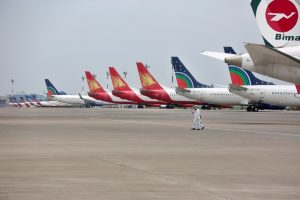Greenwatch report
World Bank Country Director Ellen Goldstein has said the decisions by the global lender regarding future project financing and implementation in Bangladesh depend on the outcome of its external panel’s assessment.
“World Bank’s Panel of internationally-recognised anti-corruption experts will issue a report assessing the adequacy of the Anti Corruption Commission’s investigation once they have had an opportunity to fully review and discuss the First Information Report (FIR). Decisions by the World Bank regarding future project financing and implementation would depend on the outcome of the External Panel’s assessment,” she said in a statement issued by the local office of the global lender.
Earlier Finance Minister AMA Muhith said the government was expecting a response from the World Bank about its next step on the Padma Bridge project funding following the recent action taken by the Anti Corruption Commission (ACC).
“We hope to get a reaction from them (WB) clearing their position on the matter (Padma Bridge). If they do so, then there could be something from me to say,” he told reporters after a function on the World Migrants Day 2012 held at the Bangabandhu International Conference Centre.
The Anti-Corruption Commission on 17 December sued seven, including high-ranking government officials, for ‘conspiring to exchange bribes’ to make Canadian construction firm SNC-Lavalin consultant for the Padma bridge project.
The move further overshadowed the fate of Padma bridge as former Communication Minister Syed Abul Hossain and State Minister for Foreign Affairs in 1996 Hasina government, Abul Hasan Chowdhury, are not on the list of accused.
The World Bank’s outside panel of experts to assess the credibility of the government’s investigation ended its second visit inconclusive early this month over the ACC’s reported reluctance to implicate the two as per the suggestion of its own inquiry committee.
On Dec 8, after the visit, the World Bank said it would not disburse its pledged loan of $1.2 billion if the graft allegation was not probed “fairly and thoroughly”.
Bangladesh, as agreed, put all officials suspected of involvement in the alleged corruption on leave pending a full investigation.
ACC Deputy Director Abdullah Al Zahid accused the seven in a case filed with Banani Police. The accused list includes Bridges Division Secretary Mosharraf Hossain Bhuiyan, who is currently on forced-leave, as the prime accused.
The other six accused are Superintending Engineer (River training) of the Bridge Authority Kazi Mohammad Ferdous, Roads and Highways Department Executive Engineer (Bridge Construction and Maintenance Division-4) Riaz Ahmed Zaber and four SNC-Lavalin officials.
They are – Deputy Managing Director of Bangladeshi firm Engineering and Planning Consultant and local Sub-Consultant of SNC-Lavalin Mohammad Mostafa, former Director of International Project Division Mohammad Ismail, former Vice-President of the International Project Division Ramesh Shah and former Vice-President and General Manager of SNC-Lavalin’s Energy & Industrial Business Unit Kevin Wallace.
“The accused made all arrangements to help SNC-Lavalin win the tender to supervise the construction of Padma bridge as a consultant through mutual collaboration. They have committed punishable offences under section 161 of the Penal Code and the 1947 law to prevent corruption,” said Banani Police Station’s Officer-in-Charge Bhuiyan Mahbub Hasan quoting the first information report.
According to the report, the ‘exchange of bribes’ was supposed to take place on the Canadian construction giant winning the job.
Regarding the two former ministers Abul Hossain and Abul Hasan, the FIR said the ACC could not gather sufficient evidence to establish their roles behind the ‘conspiracy to exchange bribe.’
The matter will be looked into further during investigations. According to rules, ACC files a case after its inquiry substantiates an allegation, followed by a full-fledged investigation before framing charges in the court.
The World Bank cancelled its agreement on the pledged loan in September last year raising allegations over appointment of a consultant to supervise it. The global lender alleged high-ranking government officials were involved in graft as the project was underway.
The government and the then Communication Minister Hossain dismissed the allegations. On one occasion, Prime Minister Sheikh Hasina herself corroborated Hossain’s claim of innocence, and called him a ‘patriot.’
Earlier on June 29 this year, the WB cancelled its $1.2 billion funding, saying it had the proof of a “corruption conspiracy” involving Bangladeshi officials, executives of a Canadian firm and some individuals.
The global lender on September 21 decided to revive the loan after the Bangladesh government agreed to the WB’s terms and conditions, and after Hossain was removed from the Ministry of Communication, and Prime Minister’s Economic Affairs Advisor Mashiur Rahman, who was integrity advisor in the project, and the Bridges Division’s Bhuiyan were sent on leave.
A deal was struck between the government and the World Bank on the introduction of new procurement arrangements for the project, with more oversight and transparency to ensure clean construction of the bridge. A three-member panel led by Luis Moreno-Ocampo, former Chief Prosecutor of International Criminal Court, was allowed to oversee the ACC investigation as part of it.
The panel had visited Dhaka once before. The fate of the project hinges on the report of this panel.
The ACC questioned 29 people during its inquiry including Hossain and Hasan, some of them more than once.
Though the anti-graft watchdog said earlier that there had been no corruption in the project, its Chairman Ghulam Hossain on Nov 27 this year admitted traces of a ‘conspiracy to exchange bribe’.
On Dec 4, the commission’s special inquiry and prosecution team submitted its report and recommended filing cases over the graft. Hossain on that day had said less than 10 had been recommended to be accused in the case.
He said they were having difficulties to reach a consensus with the World Bank panel, which was visiting the country at the time, over the list of accused, and that he was under ‘mental pressure.’
The World Bank experts left apparently dissatisfied and undecided. It was also announced by the Washington-based lender that they would make a decision over the matter once it was settled by the ACC.



